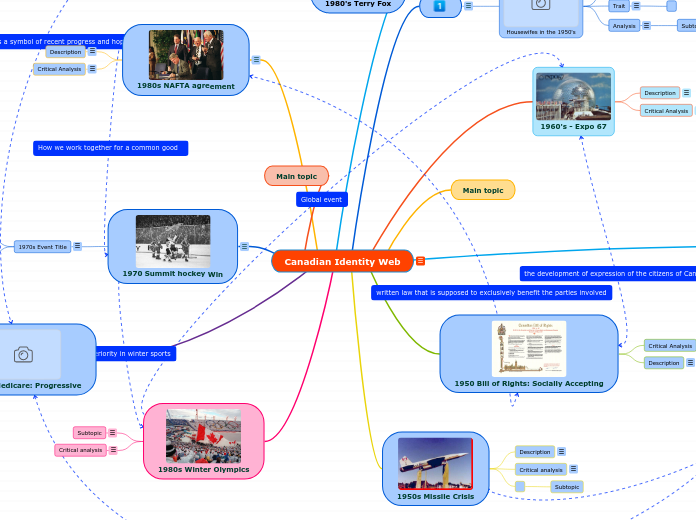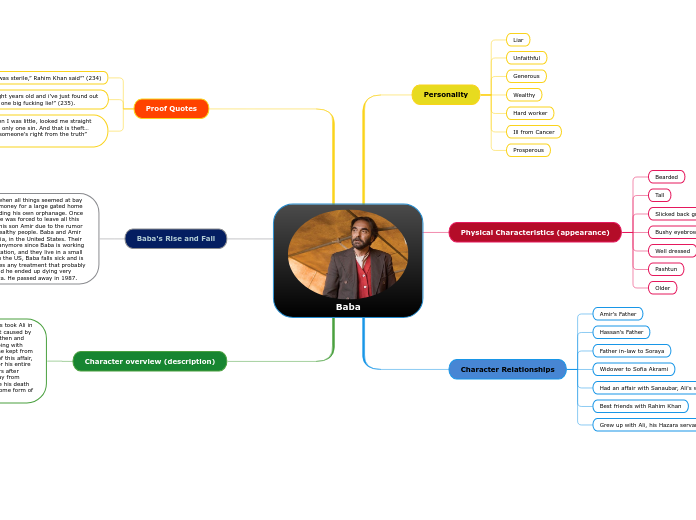Canadian Identity Web
Is Canada's identity good enough for the 21st century?
1980s Winter Olympics
I feel this trait is genuine amongst Canadians but in this piece of history more among the government as Diefenbaker didn't want to commit an act that might be viewed as aggressive which was attaching nuclear warheads to the Bomarc missile. I don't feel this identity is shared by the general canadian population however I do feel it applies well to the current government and past governments. I feel in general that being precautions is a good trait to have as normally it doesn't hurt to be precautious before doing something that might impact you or others greatly. I feel this trait is not a Canadian stereotype as I haven't heard of it before nor do I feel like the Canadian population fulfills this stereotype. I feel this identity trait does not have to change in the 21st century as the government has been applying this for a long time and it has proven to be successful for the Canadian economy and for the greater good of the country.
The CIM-10B Bomarc was the world's first nuclear ground to air anti aircraft missile. This missile was Canada's main defence against a possible Soviet attack during the cold war. Two squadrons of this missile were bought by the Canadian government in 1958. This was especially relevant to Canada as then prime minister John Diefenbaker refused to put nuclear warheads on the Bomarc which led to mixed decisions and reactions in his cabinet which led to Diefenbaker losing the 1963 election.
1960's Medicare: Progressive
Tommy Douglas and his progressive CCF wanted to apply medicare for all across Saskatchewan in the early 1960s. this was the first universal healthcare plan in Canada but it came with it mass strike from doctors which didn't last forever and they eventually saw the positives and worked again. Tommy Douglas believed that everyone deserved basic rights which was surprisingly unsupported by a few due to the high taxation. now, all of Canada has universal healthcare thanks to Tommy and the CCF.
Who: Saskatchewan citizens, Sask doctors, The CCF, Tommy Douglas
What: the Saskatchewan Government wanted to pass Canada’s first universal healthcare plan, doctors started to strike but eventually tried out the plan and found that it actually worked
Where: Saskatchewan
When: early 1960
Why: because the power at the time believed that every citizen deserved basic human needs
- Universal healthcare is now all over Canada and is significantly more successful for the population than a country like America’s paid healthcare plan
- Canada’s healthcare isn’t as progressive as it was at the time due to other countries expanding theirs while Canadians still don’t have free eye-care, and other specialized services
- Even though Canada has a very successful, some Canadians still complain about the size of taxes or long waits
Canada's trait of progressive is genuine, along with some countries in Europe, such as Sweden and Germany, Canada is one of the most progressive countries and it is because of things like our development of medicare. being progressive is more of a group effort, i'm sure all Canadians want to improve but medicare specifically has affects on taxes which some Canadians don't like. I think it is less of a stereotype and more of a fact that Canada is more progressive, through progressiveness isn't inherently measurable, you can see when certain countries applied monumental positive change and Canada is close to the front.
1970 Summit hockey Win
Superiority
1970s Event Title
Connections
Our superiority in Hockey and the NAFTA have a connection because NAFTA shows how where able work with other like other countries and their people and winning hockey shows how we can work with our fellow Canadians to succeed. The connection is that regardless of situation we are able to work with others for the common good by coroparating.
This Canadian identity trait is probably the most genuine out of the bunch and most Canadians love or enjoy hockey. This is shown by lots of Canadians playing hockey and us having seven teams in the NHL and 53% percent of the players being Canadian. We also won the world championship and the winter olympic games. This game is definitely part of the Canadian stereotype with Canadians being obsessed with the game as well as being recognized as the best world wide. This trait is certainly a good trait that Canada should keep doing to be a good team sport that keeps people fit as well as it being something that's enjoyable to watch. And this trait should not change because Canada loves and should continue to love this defining cultural entity. This is shown by our win 1972 summit win with our clear dominance in the sport being show world wide and our dominance in the sport has been continued to this day.
The eight game series between the Soviet Union and Canada faced each other in the 1972 Summit hockey championships that began on September 2nd. 4 of the games were held in Montreal, Toronto, Montreal and Winnipeg Canada and the others were held in Moscow. With both countries making it to the finals, it was an extremely hard fought game but in the end Canada came out on top winning in Moscow. With Paul Henderson getting the final goal in the last few seconds. The game would decide the winner of the hockey rivalry worldwide with Canada coming out as the undisputed hockey champions with both a affect abroad and in Canada itself.
1980s NAFTA agreement
Politically cooparetive
Politocally Cooparetive
This stereotype is good and bad at the same time. I believe that cooperativeness with those around us leads us to work together for the common good for whatever that may be. However it could also lead to being complacent and being taken advantage of by others. For example Canada was the United States ally and had taken part in many of the wars that the USA had made like the Korean war and other proxy wars during the Cold War. However we stop this complacency with the Vietnam war because it was a literal bloodbath and had no real benefit to Canada. I believe that this identity trait is shared with all Canadians with most of us willing to help our neighbour if they need help. For example building a fence on the yard that would secure both of our privacy. Also this trait I believe is part of the Canadian Stereotype with many Canadians having this value but not as massive as the stereotype as us saying sorry a lot or being overly kind. Finally, I don’t think we need to get rid of this stereotype because it’s generally thought as a good thing to have with it leading to more success with our objectives happening between Canada’s allies. It can also increase our soft power so I think keeping it would help Canada.
The North American Trade Agreement (NAFTA) started negotiations for the agreement in May of 1986 but went into effect on January 1st 1989. It was a deal between Canada, the United States but NAFTA officially took hold over the continent with Mexico being involved in 1994 1st January. The whole continent of North America (including Canada) was under the effect and all the Citizens of the three countries were under the effect of the deal. The deal was to get rid of all Tariff and Non Tariff barriers that would impede trade or investment of equity and goods between Canada, USA and Mexico. The deal was signed by The American President Ronald Reagan and then Canadian Prime Minister Brian Mulrouny. And later then Mexico President Carlos Salinas de Gortari.
1980's Terry Fox
Topic 1: Terry Fox
Who: 18 Year old Terry Fox from Port Coquitlam who survived cancer, but has an artificial leg
What: Terry Fox ran over 5,000 kilometers
When: He started running on April 12th 1980 and stopped on September 1st 1980
Where: He ran from the pacific ocean and his goal to run to the other side of Canada
Why: He was raising money for cancer research and to inspire other people
Identity Trait: Supportive
Critique: Terry Inspired multiple people to run and he gave people the confidence to fight cancer, he also raised over 850 million dollars. Other people also ran with him to encourage him and schools are hosting Terry Fox runs every year to raise money for cancer and make people remember Terry and what he did.
Cancer wasn’t beaten with just that amount of money so we still do Terry Fox runs to save peoples lives and let Terry’s spirit live.
1950s Missile Crisis
Critical analysis
I feel this identity trait is genuine amongst Canadian citizens and Canadian athletes as since this was only the second time Canada had hosted the Olympics people believed Canada would do well due to the Olympics being on home turf. I feel this identity trait is good to have as having belief in yourself and others motivates yourself and casts a good atmosphere that sets you and others up for success. I feel this trait is a Canadian stereotype as I have found Canadians to be too optimistic and too have too much belief in themselves and in others. Even though I believe belief is a good stereotype to have, I just feel Canadians overdo it a bit. I believe this identity trait should change in Canada in the 21st century as I think over believing is a waste of time and energy, and this time and energy could be used more efficiently to do other things that are more important.
The 1988 winter olympics in Calgary had over 1000 athletes both male and female, the event happens every 4 years with a different country as a host every time. Canada got 2 silver and 3 bronze medals at the end of the competition. It was significant that Canada hosted the Olympics because it was only the second time Canada hosted the Olympics in the history of the olympics.
1950 Bill of Rights: Socially Accepting
PM Diefenbaker and the Canadian Government created Canada's first human rights act in 1960 (but most of the fight for it was in 1950s and that why its in the 1950 tab) which applied through-out Canada as a way to protect Canadian citizens. This law was to protect people from from things like discrimination and violence but failed due to it only working on federal statuses.
Who: The Canadian Government and PM Diefenbaker
What: The first federal law to protect human rights within Canada, it was pretty ineffective and was practically remade as the Canadian Charter of rights in 1982
Where: all over Canada but was passed in the parliament
Why: Saskatchewan passed their own bill of rights which inspired Diefenbaker to pass one all over Canada
When: 1960
- Due to the Act only working on federal statuses, Judges were forced to interpret what that meant for their citizens which was very inconsistent
- Of the 35 cases that the bill was mentioned, only 2 were accepted, the lawyers in these cases are very aware of the law so if they think that they can win a case, they take it yet only 2/35 were successful which means these cases were really up to the judges interpretation
- This specific bill is virtually irrelevant in modern Canadian legislature due to being superseded by the charter of rights
This trait is pretty real because Canada is a relatively socially country. Even then, the parliament wanted to protect their citizens even if it didn't work well. This identity is shared between a lot of Canadians but not all. Though Canada is still very progressive, there is still conservatives who don't agree with the decisions made to protect the citizens because they know that they are safe. This is a very good trait for Canada to have, looking at a country with a bad reputation like Saudi Arabia, they are very held-back socially due to their conservative attitude.
k
Topic 2: Birth Control Pills 50 Years Old
Who: Women
What: Pills that help Women to not get impregnated celebrating their 50th anniversary
When: The approval of the pill was marked on 1960
Where: Canada
Why: To let Women choose to have a child or not
Identity Critique
Identity: Equality
Critique: The 50th Anniversary of birth control pills also marked Mother’s Day. Birth control pills have helped many women to not get impregnated and to choose whether to have a baby or not, making women more independent and get everyone closer to equality in Canada.
Subtopic
Main topic
1960's - Expo 67
Critical Analysis
Trait: Ingenity
This identity is genuine because Canada has produced many generational talents that have shown what Canadian ingenuity is. I believe this identity trait is shared with all Canadians because our country generally produces smart and creative individuals. I believe this trait is a Canadian stereotype because Canadians have been improving the world with new inventions and solutions to big problems. I think this is a great trait to have in the 21st century as ingenuity helps improve the world with new inventions and ideas.
Description
Expo 67 was a celebration of the 100th anniversary of Canada. The main theme of the exhibition was “Man And His World” showing all the achievements of man throughout history. The expo was held at Île Sainte-Hélène, a park in the centre of the St. Lawrence River in Montreal and featured 5 different exhibits: Man the Creator, Man the Explorer, Man the Producer, Man the Provider, and Man and the Community. These exhibits as mentioned before highlight the peak of human ingenuity in each category and bring in some of the best artwork and musicians ever. The Canadian flag as we know it today was revealed and showed the world what Canada was all about.









